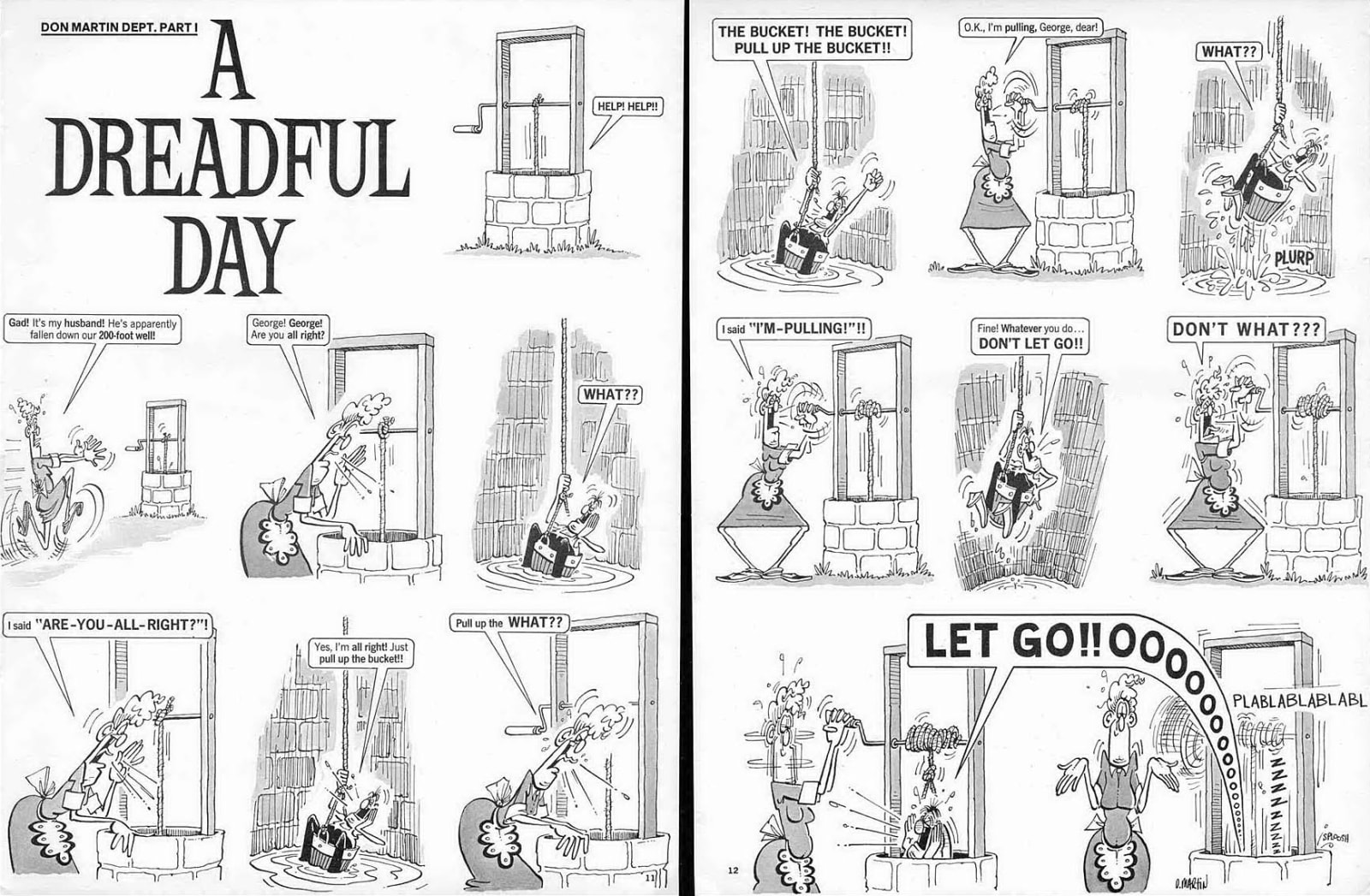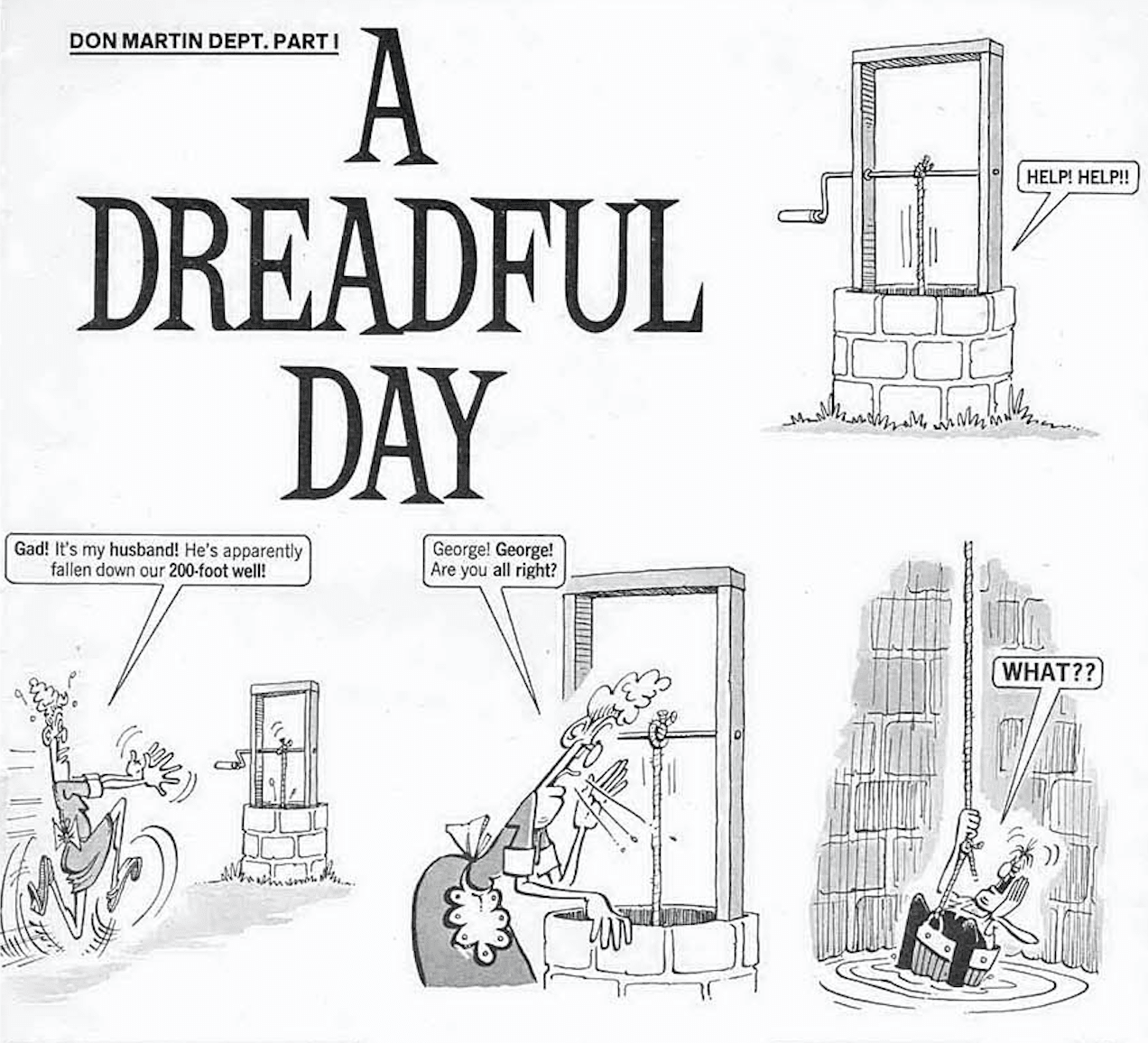




Don Martin
Further images
Provenance
Bought from Lewis Wayne Gallery September 13, 2011 DON MARTIN - MAD #98 COMPLETE 2-PG STORY "Dreadful Day ORIG ART Inventory number 2840 $ 3100
Cover art by Norman Mingo. The letters page features letters with pictures from Mick Jaqgger (of The Rolling Stones), Gerry Marsden (of Gerry & the Pacemakers), Herman's Hermits, and Donna Douglas (Elly Mae Clampett on The Beverly Hillbillies). "Surfing," script by Al Jaffee, art by George Woodbridge; Satirical look at the sport of surfing. "A Dreadful Day," script and art by Don Martin; A woman tries to rescue her husband from a well. "Flapper," script by Dick DeBartolo, art by Mort Drucker; In a parody of the TV series "Flipper," the story of a boring game warden, his two sons and the dolphin (or porpoise) who is smarter than all of them put together. "Mad's Snappy Answers to Stupid Questions," script and art by Al Jaffee. Cartoons in the margins by Sergio Aragones. "Spy Vs. Spy," script and art by Antonio Prohias. "Fight Songs For the Common Man," script by Frank Jacobs, art by George Woodbridge; New lyrics are added to famous songs to reflect the trials and tribulations of common people. "Mad's Summer Camp for Adults," script by Larry Siegel, art by Paul Coker, Jr. "The Mad Academy Awards for Small Businessmen," script by Stan Hart, art by Jack Rickard; Giving awards to small business operators who provide creative lack of service to their customers. "The Mad United States Foreign Policy Primer," script by Larry Siegel (as Lawrence Harvey Siegel), art by Bob Clarke (as Robert James Clarke). "The Lighter Side of Summer Evenings," script and art by Dave Berg. "Spy Vs. Spy Vs. Spy," script and art by Antonio Prohias. "Lord Jump," script by Larry Siegel, art by Mort Drucker; In a parody of the film "Lord Jim," a sailor branded for cowardice falls into a confrontation between island natives and a mad General and stays cowardly. "One Summer Afternoon," script and art by Don Martin. "Who Are the Disaster Victims That Nobody Helps?" Mad Fold-in by Al Jaffee
Literature
MAD MAGAZINE #98 DOLPHIN PARODY COVER EC Comics 1965 Includes: Flapper (TV Satire) Lord Jump (Movie Satire) Fight Songs For The Common Man & More! ABOUT MAD Mad is an American humor magazine founded by editor Harvey Kurtzman and publisher William Gaines in 1952. Launched as a comic book before it became a magazine, it was widely imitated and influential, impacting not only satirical media but the entire cultural landscape of the 20th century. The last surviving title from the notorious and critically acclaimed EC Comics line, the magazine offers satire on all aspects of life and popular culture, politics, entertainment, and public figures. Its format is divided into a number of recurring segments such as TV and movie parodies, as well as freeform articles. Mad's mascot, Alfred E. Neuman, is typically the focal point of the magazine's cover, with his face often replacing a celebrity or character that is lampooned within the issue. CONTRIBUTORS Mad is known for the stability and longevity of its talent roster, billed as "The Usual Gang of Idiots," with several creators enjoying 30-, 40- and even 50-year careers in the magazine's pages. According to the "Mad Magazine Contributor Appearances" website, more than 700 contributors have received bylines in at least one issue of Mad, but fewer than three dozen of those have contributed to 100 issues or more.[44] Al Jaffee has appeared in the most issues (461 as of August 2011). The other six contributors to have appeared in more than 400 issues of Mad are Sergio Aragonés, Dick DeBartolo, and Mort Drucker; Dave Berg, Paul Coker and Frank Jacobs have each topped the 300 mark. (The list calculates appearances by issue only, not by individual articles or overall page count; e.g. although Jacobs wrote three separate articles that appeared in issue #172, his total is reckoned to have increased by one.) Each of the following contributors (including those noted above) has created over 150 articles for the magazine: Writers: Dick DeBartolo Desmond Devlin Stan Hart Frank Jacobs Tom Koch Arnie Koger Larry Siegel Lou Silverstone Mike Snider Writer-Artists: Sergio Aragones Dave Berg John Caldwell Duck Edwing Al Jaffee Don Martin Paul Peter Porges Antonio Prohías Artists: Bob Clarke Paul Coker Jack Davis Mort Drucker Jack Rickard Angelo Torres Wally Wood George Woodbridge OTHER CONTRIBUTORS Among the irregular contributors with just a single Mad byline to their credit are Charles M. Schulz, Chevy Chase, "Weird Al" Yankovic, Andy Griffith, Will Eisner, Kevin Smith, J. Fred Muggs, Boris Vallejo, Sir John Tenniel, Jean Shepherd, Winona Ryder, Jimmy Kimmel, Jason Alexander, Walt Kelly, Rep. Barney Frank, Tom Wolfe, Steve Allen, Jim Lee, Jules Feiffer, Donald Knuth and Richard Nixon, who remains the only President credited with "writing" a Mad article. Contributing just twice are such luminaries as Tom Lehrer, Gustave Doré, Danny Kaye, Stan Freberg, Mort Walker and Leonardo da Vinci. (Mr. da Vinci's check is still waiting in the Mad offices for him to pick it up.) Frank Frazetta (3 bylines), Ernie Kovacs (11), Bob and Ray (12), and Sid Caesar (4) appeared slightly more frequently. In its earliest years, before amassing its own staff of regulars, the magazine frequently used outside "name" talent. Often, Mad would simply illustrate the celebrities' preexisting material. The magazine has occasionally run guest articles in which notables from show business or comic books have participated. In 1964, an article called "Comic Strips They'd Really Like To Do" featured one-shot proposals by cartoonists including Mell Lazarus and Charles M. Schulz. More than once, the magazine has enlisted popular comic book artists such as Frank Miller or Jim Lee to design and illustrate a series of "Rejected Superheroes." In 2008, the magazine got national coverage for its article "Why George W. Bush is in Favor of Global Warming." Each of the piece's ten punchlines was illustrated by a different Pulitzer Prize–winning editorial cartoonist.
Join our mailing list
* denotes required fields
We will process the personal data you have supplied in accordance with our privacy policy (available on request). You can unsubscribe or change your preferences at any time by clicking the link in our emails.




